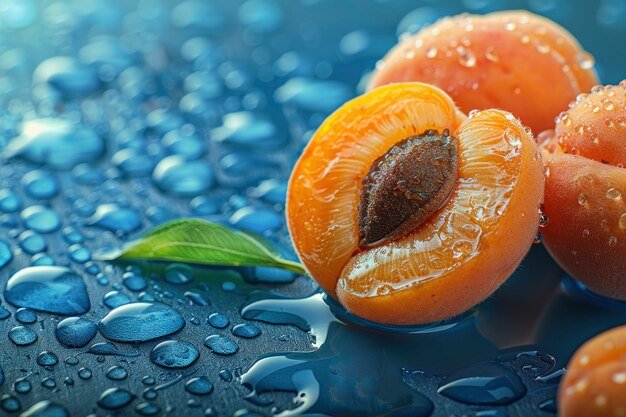A legacy of innovation, quality, and culinary experience.
Read our NewsletterDiscover the amazing health benefits of apricots, their nutrition profile, and versatile uses. Discover why this sweet fruit is a powerhouse of wellness and how to incorporate it into your meals.
Apricots are small, golden-orange fruits with a delightful balance of sweetness and tartness. Known for their smooth skin and fragrant flesh, they belong to the Prunus family alongside peaches, cherries, and plums. Originally cultivated in Asia, apricots have spread worldwide, becoming a staple in both fresh and dried forms.
These fruits are not only versatile in the kitchen but also rich in nutrients that support health and vitality. Whether enjoyed fresh from the orchard, blended into smoothies, or paired with traditional dishes like Stuffed Grape Leaves, apricots offer both delicious flavor and incredible wellness benefits.

Despite their low calorie count, apricots are loaded with essential nutrients. A serving of two fresh apricots (about 70 grams) provides only 34 calories but supplies a wealth of vitamins, minerals, and antioxidants:
Vitamin A & Beta-Carotene – Essential for vision and healthy skin.
Vitamin C – Boosts immune defenses and supports collagen formation.
Potassium – Helps maintain hydration, nerve function, and healthy blood pressure.
Dietary Fiber – Improves digestion and satiety.
Vitamin E – Protects against oxidative stress.
Copper & Iron – Support blood health and energy levels.
The dense nutrient profile makes apricots ideal for combining with other wholesome foods. For instance, serving apricots with Fava Beans creates a balanced dish that combines the sweetness of fruit with the protein-rich benefits of plant-based ingredients.
The health benefits of apricots are given below:
Apricots are rich in vitamin A and beta-carotene, which protect against eye conditions such as age-related macular degeneration. Their antioxidant properties reduce oxidative stress on eye cells. For a nutrient-packed dish that promotes vision health, consider pairing apricots with the vibrant goodness of Golden Corn.
Vitamin C in apricots supports collagen production, while vitamin E shields skin from damage caused by free radicals. This combination helps maintain smooth, youthful skin. Culinary pairings also enhance benefits—for example, adding apricots to dishes prepared with Mushroom Slices creates a savory-sweet blend rich in antioxidants and minerals.
Apricots contain soluble fiber that supports healthy bowel movements and nourishes gut bacteria. Regular fiber intake can also help regulate appetite and support weight management. A wonderful way to enjoy apricots is by mixing dried pieces into a Pasta Fusilli salad, which combines fiber from both the pasta and the fruit for a digestion-friendly meal.
Potassium in apricots helps regulate blood pressure, while antioxidants reduce LDL cholesterol levels. Together, these properties support cardiovascular wellness. Cooking apricots into sauces with Whole Peeled Tomatoes creates a nutrient-rich accompaniment that is both heart-healthy and flavorful.
The combination of vitamin C and polyphenols strengthens the body’s immune system. These nutrients help protect against infections and accelerate recovery. For a refreshing, immune-boosting drink, blend apricots into smoothies or mix them with Adani Tea for a uniquely soothing beverage.
Fresh apricots have a high water content, making them a naturally hydrating food. Their potassium content also helps balance electrolytes, especially during warm weather or after exercise. A refreshing combination is apricots served with Pineapple Slices, resulting in a tropical, rehydrating treat.
Although not as well-known, apricots contribute to bone health through minerals such as calcium, phosphorus, and potassium. Combined with a balanced diet, they may help reduce the risk of osteoporosis.
One of the standout features of apricots is their versatility in the kitchen. Their sweet-tart flavor pairs well with desserts, savory meals, and snacks.
Fresh Apricots – Perfect as a quick snack or sliced into fruit salads.
Dried Apricots – Portable and energy-dense, often included in trail mixes and energy bars.
Cooking & Baking – Used in tarts, jams, chutneys, and sauces.
Savory Dishes – Frequently incorporated into Mediterranean cuisine, where their sweetness balances savory ingredients such as Stuffed Grape Leaves. Because they complement both fruits and vegetables, apricots can be enjoyed in countless creative combinations.

Adding apricots to daily meals is simple, and their versatility allows them to be incorporated into both modern and traditional recipes. Here are some ideas:
1. Salads – Fresh apricot slices add a burst of flavor to green salads. Combine them with golden corn and leafy greens for a colorful, nutrient-rich side dish.
2. Pasta Dishes – Chop dried apricots into a Pasta Fusilli salad for a fruity contrast to savory dressings.
3. Savory Mains – Use apricot puree as a glaze for grilled chicken or lamb, served with earthy Mushroom Slices.
4. Smoothies – Blend apricots with yogurt and ice, adding a splash of Adani Tea for a refreshing twist.
5. Sauces – Cook apricots down with onions, garlic, and Whole Peeled Tomatoes for a tangy sauce that complements pasta or grilled vegetables.
6. Desserts – Combine chilled apricots with Pineapple Slices and honey for a light dessert.
These ideas highlight how apricots can elevate everyday meals into nutrient-rich culinary experiences.

For centuries, apricots have been staples in Mediterranean and Middle Eastern cooking. Dried apricots are a key ingredient in stews, rice dishes, and celebratory meals. Their natural sweetness balances savory spices and proteins, giving dishes depth and complexity.
In modern kitchens, apricots are celebrated in plant-based diets, smoothies, and baked goods. Their compatibility with legumes, such as fava beans, makes them a natural fit for vegetarian-friendly recipes that emphasize both nutrition and taste.
To enjoy apricots at their peak, select fruits that are golden-orange in color, slightly soft to the touch, and free from blemishes.
Ripening – Store at room temperature until the fruit is ripe.
Refrigeration – Once ripe, apricots can be stored in the refrigerator for up to a week.
Freezing – For long-term use, slice apricots and freeze them.
Dried Varieties – Choose unsweetened, unsulfured dried apricots for a healthier snack option.
Fresh apricots can be stored alongside pantry staples such as Stuffed Grape Leaves to make quick, nourishing meals.
Apricots are much more than a seasonal fruit. They’re a nutritional powerhouse rich in vitamins, minerals, antioxidants, and fiber, which contribute to better vision, glowing skin, improved digestive health, and a strong immune system. Their unique sweet-tart flavor makes them one of the most versatile ingredients, suitable for both sweet desserts and savory main courses.
Next time you shop at Goodycs, consider adding apricots to your basket. Pair them with pantry staples to create wholesome, balanced meals that delight the taste buds and nourish the body.